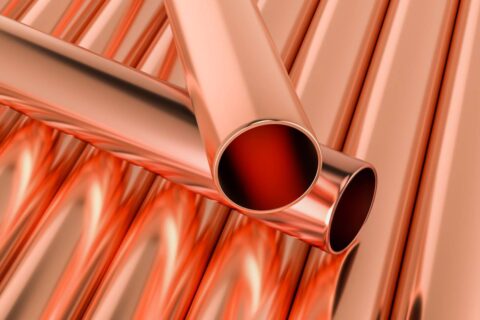Where Does Copper Originate?
Copper is a naturally occurring metal commonly used in electrical wiring and water pipes due to its superior conductivity and durability. Although you can actually find sources of “native copper” (aka pure nuggets of natural copper), they are quite rare. Most of the copper we use to create wiring and pipes is actually smelted from minerals like chalcopyrite and bornite, both of which contain higher levels of the metal. But where does copper originate?
Where Does Copper Originate?
As far as location goes, the most important copper-producing countries in the world are Chile, Peru, and China. That said, you can find copper originate (as well as the minerals that contain it) all over the world. In the United States, for instance, there are relatively large mines in Utah, Montana, Michigan, Arizona, and New Mexico.
Thanks to copper’s notable characteristics and relative availability, human beings have been using copper since the Bronze Age, but our uses have changed considerably over the last five thousand years. To get a better understanding of where the copper in our homes comes from, let’s take a closer look at the mining and smelting process that makes your copper re-piping services in Highland Park possible.
Making Copper from Minerals
As mentioned above, pure copper nuggets remain relatively rare. So the vast majority of the world’s copper ends up derived from mixed mineral sources. These minerals prove a great source of copper ore. There exist two primary ways of mining copper ore.
- Underground mining involves creating a vertical shaft down into the earth with horizontal branches that penetrate the targeted ore.
- Open-pit mining remains far more common, as miners use it about 90% of the time. That proves because it doesn’t involve deep drilling. Instead, open pit mining only requires the removal of surface layers. From there, diluted sulfuric acid dissolves the copper, allowing the outfit to remove the copper using electrolytic refining.
The entire process contains a number of steps that eventually leave you with 99.99% pure copper. This stands as the level necessary to provide the greatest benefit across applications. Fortunately, the process can see itself repeated with copper once it has seen use. So approximately 1/3 of the world’s copper demand remains met through recycling.
The Applications of Copper
Most of our daily lives would not be possible without copper. It sees use in:
- Our electronics
- Your plumbing
- Our communication networks
In fact, just looking around a room will reveal dozens of items that contain copper. That isn’t a coincidence. Copper has a number of attributes that make it ideal for modern appliances and utilities. Copper is:
- Super Conductive: Copper allows electricity to travel from one point to another with ease.
- Excellent Thermal Conductor: Copper responds to temperature changes quickly, heating and cooling with ease.
- Antimicrobial: Chilean copper manufacturer’s actually started using copper as part of the country’s effort to combat COVID-19 because copper can kill microbes through contact. The length of contact required depends on the microbe, but some are destroyed in thirty seconds or less.
- Durable: Copper is one of relatively few materials that can withstand the intense pressure created by modern plumbing.
- Corrosion Resistant: Copper is resistant to damage caused by moisture, oxidation, and friction, making it ideal for plumbing.
- Ductile: Copper can be reshaped to meet our needs without losing any of its strength or other important qualities.
Dealing with Copper in Your Home
As you can probably tell, copper is incredibly important to the proper function of your home. And it can require a touch of expertise to treat it appropriately. If you’re concerned about the copper pipes in your home, then contact plumbing services in Highland Park to make sure the job gets done right the first time.


